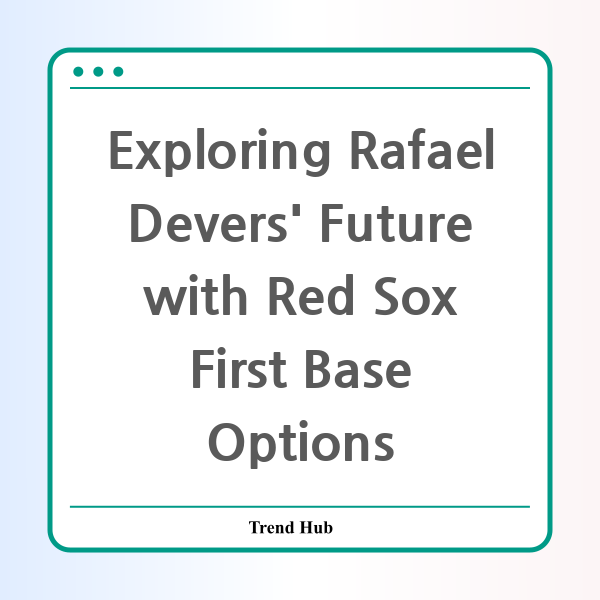* This website participates in the Amazon Affiliate Program and earns from qualifying purchases.

As the Boston Red Sox navigate a challenging season, fans are left wondering about the future of their star player, Rafael Devers. With the recent acquisition of first baseman Ryan Noda from the Los Angeles Angels, the Red Sox are clearly making moves to bolster their roster. But what does this mean for Devers’ role on the team?
Since Triston Casas’ season-ending knee injury, the Red Sox have been scrambling to find a viable replacement at first base. They have cycled through multiple players including Romy Gonzalez, Abraham Toro, and Nick Sogard, but none have offered the stability the team desperately needs. In response, the front office has now turned to Noda, who boasts an impressive track record in Triple-A, to fill this crucial position.
Rafael Devers, known for his explosive batting and defensive skills at third base, was briefly considered for a position switch to help alleviate the situation at first. However, with the addition of Noda, the likelihood of Devers making a positional shift has diminished significantly. Fans have mixed feelings about this development—many appreciate Devers’ value at third but also see the need for versatility on the roster.
Noda’s performance in the minor leagues has been promising, with a standout season last year where he hit 22 home runs and maintained an impressive .877 OPS at Triple-A Las Vegas. Though the environment in Las Vegas is known for aiding hitters, his potential to contribute could provide the Red Sox with the spark they need. Additionally, he is expected to join the rotation at first base, allowing Devers to remain entrenched at third.
While the team has made strides in securing Noda, the overall performance of the roster continues to hold the spotlight. The Red Sox have also had to make tough decisions, such as placing outfielder/designated hitter Masataka Yoshida on the 60-day injured list to make space for Noda. Injuries and inconsistent performances have plagued the roster, making the contributions of each player even more critical as they aim for a competitive edge in the AL East.
It’s important to note that Devers’ skill set remains invaluable to the Red Sox. He has the ability to change the dynamic of a game with his bat, and keeping him focused on third base may ultimately benefit the team in the long run. The front office’s decision to explore other first base options while maintaining Devers in his natural position indicates a strategic approach to roster management during the ongoing season.
With the Red Sox set to face the Baltimore Orioles in a doubleheader at Fenway Park, all eyes will be on how Noda integrates into the lineup. For Devers, the pressure remains to perform at a high level as he solidifies his legacy with the team. The fans will be eager to see whether Noda can provide the necessary stability at first base and what that means for Devers’ place within the organization.
In summary, while Rafael Devers continues to be a cornerstone of the Boston Red Sox, the recent trades and roster changes signal a commitment to optimizing the team’s performance. Only time will tell how these adjustments will impact the rest of the season and Devers’ future with the franchise.
* This website participates in the Amazon Affiliate Program and earns from qualifying purchases.